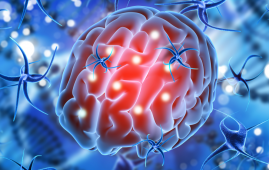

A new study links greater acetaminophen usage during pregnancy, particularly in the second trimester, to small but significant increases in attention and behavior issues in 2-, 3-, and 4-year-olds. The study contributes to a growing body of evidence linking regular acetaminophen use during pregnancy to developmental difficulties in offspring.
The results are published in the journal Neurotoxicology and Teratology
The study is part of the Illinois Kids Development Study at the University of Illinois Urbana-Champaign, which investigates how environmental exposures affect infant development. The study followed hundreds of children, gathering information about their prenatal chemical exposures and asking caregivers to rate their behaviors and features at ages 2, 3, and 4.
While acetaminophen is considered the safest pain reliever and fever reducer available during pregnancy, previous studies have found evidence of a range of potential negative outcomes for children exposed to the drug during gestation, according to Megan Woodbury, a graduate student at the University of Illinois who led the research with comparative biosciences professor emerita Susan Schantz, the principal investigator of the IKIDS program at Illinois. Woodbury is currently a postdoctoral researcher at Northeastern University in Boston. Schantz is a faculty member at the University of Illinois’ Beckman Institute for Advanced Science and Technology.
A recent study performed by Woodbury and Schantz connected increased acetaminophen exposure during pregnancy to language problems in children.
Previous research has found no link between acetaminophen use during pregnancy and attention and behavior in children, whereas other, usually larger studies have found links between more frequent use of the medication during pregnancy and attention-related and behavioral problems in offspring. The majority of the latter trials were conducted on older children, and pregnant individuals were asked if they used acetaminophen at least once every trimester. The current study asked pregnant parents about their acetaminophen use six times during the pregnancy, or around once every four to six weeks, to provide a more exact picture of the volume and timing of medication exposure.
The researchers also asked caregivers to complete dozens of standardized questions on their child’s behavior and attention span at ages 2, 3, and 4. More than 300 children were tested at age two, with 262 assessed again at three and 196 at four.
“Our most important finding was that with increasing acetaminophen use by pregnant participants, especially during the second trimester, their children showed more attention-related problems and ADHD-type behaviors, which we call ‘externalizing behaviors,’ at every age we measured,” he added.
“The kinds of behaviors the caregivers reported included things like the child talking out of turn, not paying attention, not being quiet when they were supposed to be quiet, not sitting down when they were supposed to be sitting down, and being a little aggressive with other children.”- Susan Schantz, principal investigator of the IKIDS program at Illinois
According to Schantz, the findings do not indicate that the youngsters have attention-deficit/hyperactivity disorder or will be diagnosed with ADHD at a later date. However, the children appear to be having more difficulty paying attention than classmates of the same age who were less or not exposed to acetaminophen in the womb.
Woodbury, who is pregnant herself, says she doesn’t want to discourage others from taking acetaminophen during pregnancy when necessary. Extreme headaches or other painful episodes, as well as fevers, can be incapacitating and even deadly, necessitating the use of medication. She stated that she had used acetaminophen once every trimester so far. However, she does not use it to treat mild aches, pains, or fevers.
More study is needed to determine whether taking acetaminophen more frequently during the second trimester of pregnancy is particularly harmful to the developing brain, according to the researchers. The study is further constrained in that the participants were primarily white, non-Hispanic, and of better socioeconomic position. Schantz and her team are working to expand the IKIDS cohort to include pregnant people from a wider range of socioeconomic and racial backgrounds.
For more information: The relationship of prenatal acetaminophen exposure and attention-related behavior in early childhood, Journal Neurotoxicology and Teratology, https://doi.org/10.1016/j.ntt.2024.107319
more recommended stories
 Brain Pulsations Linked to High BMI
Brain Pulsations Linked to High BMIAccording to a new study from.
 Brain Age Estimation: EEG Advancements in Neurology
Brain Age Estimation: EEG Advancements in NeurologyTo estimate brain age using EEG.
 Unlocking Ketogenic Diet for Epilepsy Management
Unlocking Ketogenic Diet for Epilepsy ManagementExploring the Therapeutic Potential of Ketogenic.
 Senescence in Neurons: Findings
Senescence in Neurons: FindingsBased on a new study by.
 Balanced Diet Linked to Enhanced Brain Health
Balanced Diet Linked to Enhanced Brain HealthDiet and brain health are strongly.
 Acid-Reducing Drugs Linked to Higher Migraine Risk
Acid-Reducing Drugs Linked to Higher Migraine RiskIndividuals who utilize acid-reducing drugs may.
 Atrial Fibrillation in Young Adults: Increased Heart Failure and Stroke Risk
Atrial Fibrillation in Young Adults: Increased Heart Failure and Stroke RiskIn a recent study published in.
 Neurodegeneration Linked to Fibrin in Brain Injury
Neurodegeneration Linked to Fibrin in Brain InjuryThe health results for the approximately.
 DELiVR: Advancing Brain Cell Mapping with AI and VR
DELiVR: Advancing Brain Cell Mapping with AI and VRDELiVR is a novel AI-based method.
 Retinal Neurodegeneration in Parkinson’s Disease
Retinal Neurodegeneration in Parkinson’s DiseaseBy measuring the thickness of the.

Leave a Comment